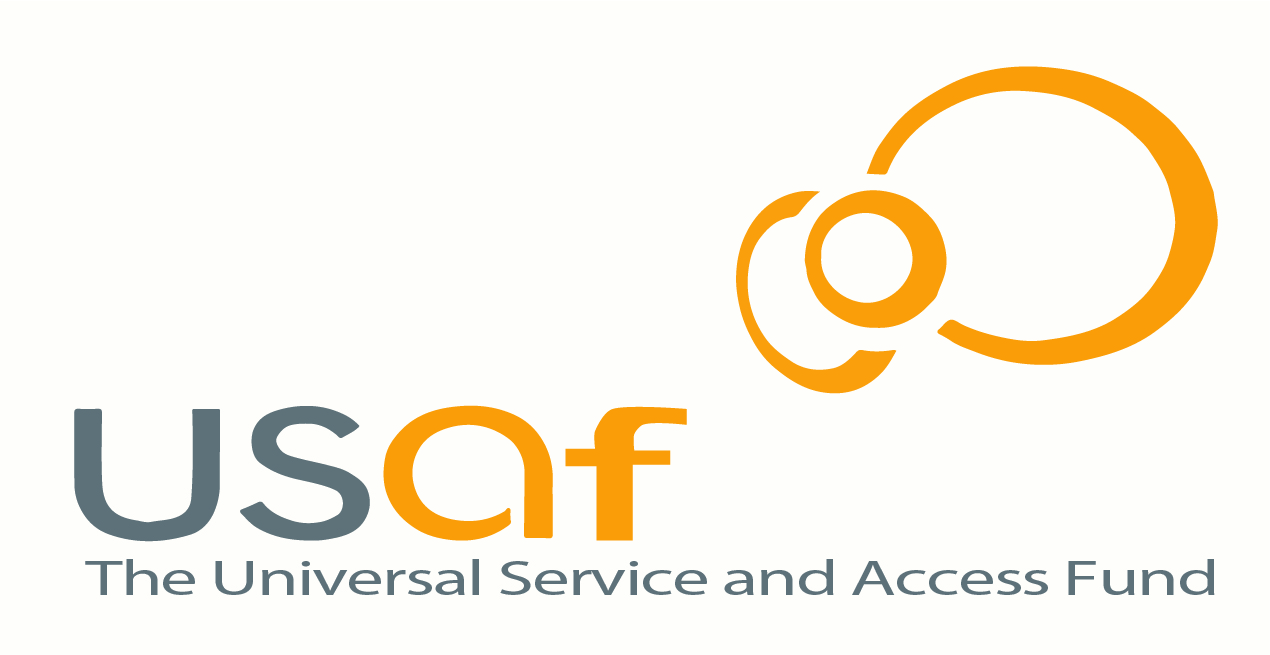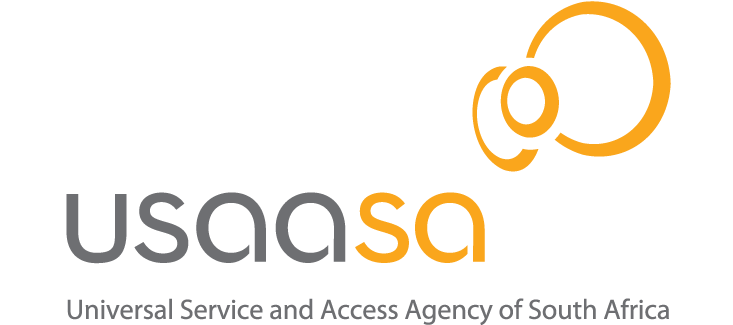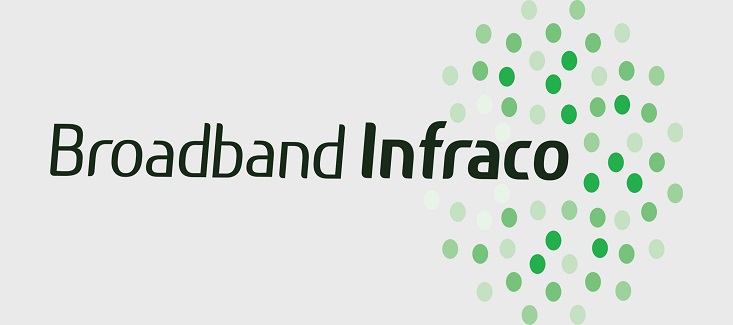- Details
South African Post Office
 LEGISLATIVE MANDATE
LEGISLATIVE MANDATE
To conduct postal services in the country and offer financial services through Postbank.
FINANCIAL RELATIONSHIP
Transfer of funds
NATURE OF OPERATIONS
Provides postal and related services including the financial services activities of Postbank to the public.
- Details
USAF
 LEGISLATIVE MANDATE
LEGISLATIVE MANDATE
The Universal Service and Access Fund was established in terms of section 89 (1) of the Electronic Communications Act (2005).
FINANCIAL RELATIONSHIP
Transfer of funds
NATURE OF OPERATIONS
To make payments for subsidies towards the provision of ICT services, as well as the construction or extension of electronic communications for needy person in under-serviced areas.
CONTACT DETAILS
- Details
USAASA
 LEGISLATIVE MANDATE
LEGISLATIVE MANDATE
To manage Universal Service Fund in the promotion of universal service and universal access to electronic communications services, electronic communications networks, and broadcasting services.
FINANCIAL RELATIONSHIP
Transfer of funds
NATURE OF OPERATIONS
Through research USAASA advises on policy matters. Through the disbursement of project subsidies, it actions universal access obligations in under-serviced areas.
CONTACT DETAILS
- Details
Film & Publication Board

LEGISLATIVE MANDATE
The Film and Publications Board was established in terms of Films and Publications Act of 1996 to Regulate the creation, production, possession, and distribution of certain publications and certain films by means of classification, the imposition of age restrictions, and giving of consumer advice.
FINANCIAL RELATIONSHIP
Transfer of funds
NATURE OF OPERATIONS
Ensures protection of children against premature exposure to adult experiences and harmful materials; provides consumer advice to enable adults to make informed viewing, reading, and gaming choices, for themselves and for children in their care; as well as criminalising child pornography.
CONTACT DETAILS
- Details
SENTECH
 LEGISLATIVE MANDATE
LEGISLATIVE MANDATE
To provide broadcasting signal distribution for broadcasting licensees.
FINANCIAL RELATIONSHIP
Transfer of funds
NATURE OF OPERATIONS
Provides broadcasting signal distribution for broadcasting licensees.
CONTACT DETAILS
Broadband Infraco

Legislative Mandate
To be recognised as the wholesale provider of choice for backhaul connectivity.
Financial Relation
Transfer of funds
Nature of Operations
To ensure that the high capacity connectivity and bandwidth requirements for specific projects of national interests are met
Contact Details
- Details
Guidelines for Policy Makers
A National Checklist
Comprehensive Legal Framework
It will generally be necessary for there to be in place a body of laws which makes it clear that any and every crime that can be committed against a child in the real world can, mutatis mutandis, also be committed on the Internet or on any other electronic network. It may also be necessary to develop new laws or adapt existing ones to outlaw certain types of behaviour which can only take place on the Internet, for example the remote enticement of children to perform or watch sexual acts, or “grooming” children to meet in the real world for a sexual purpose.
Ancillary to these purposes it will generally be necessary for there to be in place a legal framework which outlaws the misuse of computers for criminal ends, outlaws hacking or other malicious or non-consensual use of computer code and establishes that the Internet is a locus within which crimes can be committed.
Need For a National Focus on Online Child Protection
Several national governments have found it useful to bring together all of the key stakeholders and players to focus on developing and implementing a national initiative around making the Internet a safer place for children and young people, and raising awareness of the issues and how to deal with them in a very practical way. It will be important within this strategy to realise that the Internet can now be accessed via several different kinds of devices. Computers are only one of many ways of going online.
Mobile phones, games consoles and PDAs are also increasingly important. The providers of both wireless and fixed-line access need to be involved. Additionally in many countries the network of public libraries, telecentres and Internet cafes can be important sources of Internet access particularly for children and young people.
Some countries have found it to be advantageous to establish a self or coregulatory model in relation to developing policy in this area and through such models they have, for example, published codes of good practice to guide the Internet industry in terms of the measures which may work best when it comes to keeping children and young people safer online.
This has also worked at the regional level, for example within the European Union where EU-wide codes have been published both for social networking sites and mobile phone networks in relation to the provision of content and services to children and young people via their networks.
Self and co-regulation can be a very effective way of helping to engage and sustain the involvement of all relevant stakeholders and can also be very effective in terms of enhancing the speed with which appropriate responses to technological change can be formulated and put into effect. Schools and the education system generally will play a very important part in rolling out such a national strategy, but the strategy also needs to go wider than that.
Consideration should also be given to enlisting the aid of the mass media in promoting awareness messages and campaigns.
Need to Develop Local Resources Which Reflect National Laws and Local
Many of the large Internet companies produce web sites which contain a great deal of information about online issues for children and young people. However, very often this material will only be available in English or in a very narrow band of languages. It is very important, therefore, that materials are produced locally which reflect local laws as well as local cultural norms. This will be essential for any Internet safety campaign or any training materials that are developed.
Need for Public Education and Awareness Activities Cultural Norms
Parents and guardians and professional, such as teachers, have a crucial role to play in helping to keep children and young people safer online. Educational and outreach programmes should be developed which help build awareness of the issues and also provide strategies for dealing with them. When producing educational materials it is important to bear in mind that many people who are new to the technology will not feel comfortable using it.
For that reason it is important to ensure that safety materials are made available in either written form or produced using other media with which newcomers will feel more familiar, for example, with video. Within any education and awareness campaign it will be important to strike the right tone. Fear-based messaging should be avoided and due prominence should be given to the new technology’s many positive and fun features. The Internet has great potential as a means of empowering children and young people to discover new worlds.. Teaching positive and responsible forms of online behaviour is a key objective of education and awareness programs.
Need for Reporting Mechanisms for Online Predatory Behaviour, Including Bullying
Mechanisms for reporting abuse of an online service or for reporting objectionable or illegal behavior online, for example to a national hotline, should be widely advertised and promoted both on the Internet and in other media. Links to report abuse mechanisms should be prominently displayed on relevant parts of any web site that allows user generated content to appear.
It should also be possible for people who feel threatened in any way, or for people who have witnessed any worrying activity on the Internet, to be able to report it as quickly as possible to the relevant law enforcement agencies who need to be trained and ready to respond. The Virtual Global Taskforce is a law enforcement body which provides a 24/7 mechanism to receive reports about illegal behaviour or content from persons in the USA, Canada, Australia and Italy, with other countries expected to join soon. See www.virtualglobaltaskforce.com
Helping Children to Stay Safer Through the Use of Technical Tools
There are a number of software programmes available which can help screen out unwanted material or block unwanted contacts. Some of these child safety and filtering programmes may be essentially free because they are part of a computer’s operating system or they are provided as part of a package available from an ISP or ESP. The manufacturers of some game consoles also provide similar tools if the device is Internet enabled. These programmes are not foolproof but they can provide a welcome level of support, particularly in families with younger children.
These technical tools should be used as part of a broader arsenal. Parental and/or guardian involvement is critical. As children start getting a bit older they will want more privacy and they will also feel a strong desire to start exploring on their own. In addition, where a billing relationship exists between vendor and customer, age verification processes can play a very valuable role in helping vendors of age restricted goods and services or the publishers of material which is intended only for audiences at or above a certain age, to reach out to those specific audiences. Where no billing relationship exists the use of age verification technology may be problematic or in many countries it may be impossible due to a lack of reliable data sources…
- Details
Guidelines for Industry
For ISPs and other online providers to engage effectively in the Child Online Protection Initiative, it is crucial that they have a clear understanding of how content and services are classified in the jurisdictions within which they operate. Collaborating with local broadcasters should be very helpful in terms of developing such an understanding. It is also important to understand how the local legislation perceives the ‘location’ of content and determines the ‘place’ at which a service is delivered or received. Each country has a responsibility to develop their own legislation that they can apply to Internet content and services within their jurisdiction.
Unfortunately, as several studies have shown, many countries have insufficient or inadequate legislation to deal with the issue of online child protection. Additionally different jurisdictions hold differing views. These differences can be abused or exploited to the detriment of children. Criminals and child abusers will know which countries have the weakest laws or the least developed mechanisms for dealing with these sorts of issues and they will naturally gravitate towards them unless counter-vailing measures are taken.
Given this inconsistency in the legislative and policy frameworks across different countries, it is imperative that the Internet industry at large embrace best practice guidelines and adopt global standards and codes of practice that allow them to exercise a socially responsible effort towards dealing with the issue of child online protection.
In many countries around the world, industry is taking a lead and adopting voluntary and self-regulatory approaches that demonstrate commitment to developing a responsible approach to children’s use of online ICT and communications. It is very much in the industry’s interests to take action, to get ahead of the curve, not only because it is the right thing to do from a moral perspective, but also because, in the longer run it will help develop public confidence in the Internet as a medium.
Without that confidence and trust, the technology will never deliver or fulfil its enormous potential both to enrich and empower individuals but also to add to the economic prosperity and well being of each country.
- Details
Guidelines for Parents
The safety tips draw on analysis the data gathered and available research. This section of the paper is intended to provide, in one convenient place, guidelines to parents, guardians and educators to help them teach their children how to have a safe, positive and valuable experience while online. Parents, guardians and educators must consider the exact nature of the different sites, and their child’s understanding of the dangers and the likelihood that the parent can reduce risks, before deciding which environment is right for their child.
The Internet has great potential as a means of empowering children and young people to help and find things out for themselves. Teaching positive and responsible forms of online behaviour is a key objective.
Safety & security of your personal computer
Keep the computer in a common room
Keeping the computer in a common room and being present especially when younger children are using the Internet can be very important. If you cannot be present, consider other ways of keeping a close watch on what your children are doing online, for example by using technical tools. In larger families with multiple computers there may be some practical limits which also arise if you insist on them all being in the same room at the same time, and remember as children start to get older they are anyway entitled to some privacy. As more and more children acquire laptops, and wireless networks become commonplace in private homes, it will also be more difficult to maintain a rule of this kind.
Rules
Agree house rules about using the Internet and personal devices, giving particular attention to issues of privacy, age inappropriate places, bullying and stranger danger
As soon as children begin to use the Internet on their own, discuss and establish a list of agreed rules. These rules should include when children can use the Internet and how they should use it.
Internet sites features review
Consider whether filtering and blocking or monitoring programmes can help support or underpin children’s and young people’s safe use of the internet and personal devices. If you use such software explain what it does and why you are using it to your children. Keep confidential any relevant passwords linked to these programmes.
Issues of trust and a young person’s right to privacy can arise where technical tools are used, particularly monitoring programmes. In normal circumstances it is highly desirable that a parent or guardian discusses their reasons for wanting to use of this type of software, and in schools its use should also be fully explained.
Children’s educations
Prevent children from sharing personally identifiable information
Help your children understand what information should be kept private. Explain that children should post only information that you – and they – are comfortable with others seeing. Remind your children that once they post information online, they cannot take it back.
Internet sites safe usage review
Ensure children follow age limits of the Internet site
If children are under the age recommended by the Internet sites, do not let them use the sites. It is important to remember that parents cannot rely on the service provider being able to keep underage children from signing up.
Communication
Communicate with your children about their experiences
Talk to your children regularly about where they go and who they speak to when they go online. Encourage your children to tell you if something they encounter on the Internet makes them feel uncomfortable or threatened. Remind your children to stop immediately whatever they are doing when they feel uncomfortable or become suspicious. Be sure they understand they will not get in trouble for bringing something to your attention. In turn, you, as the parent and adult, should not overreact when your child shares their experience with you. Stay calm regardless of what they tell you, get all the facts, and then take action. Praise your child for trusting you. Ensure children can report abusers.
Parents’,Guardians’and Teachers’education
Parents should become familiar with the Internet sites used by their children (i.e. services and products offered by Internet sites) and have a good understanding of how children spend their time online
Evaluate the sites that children plan to use and read the privacy policy, terms of use and codes of conduct (often called “House Rules”) carefully, together with any dedicated parents’ page. Also, find out if the site monitors content posted on the services pages and review your child's page periodically. Check to see if any products are sold on the site.
- Details
COP Guidelines
The World Congress III against Sexual Exploitation of Children and Adolescents took place in Rio de Janeiro, Brazil, from 25 to 28 November 2008.
There were 3,500 participants including 300 adolescents – 150 of which were from foreign countries.
It concluded with an outcome document called the “Rio de Janeiro Declaration to Prevent and Stop Sexual Exploitation of Children and Adolescents”, which contains the “Adolescent Declaration to End Sexual Exploitation”. Here are some of the key messages from children and young people to the world:
We the children of the world commend the Government of Brazil and the other governments and responsible agencies for giving us the children, the present and future of the world, a voice at this World Congress III.
We are at this moment calling for governmental actions to effectuate laws and policies that redound to the benefit, protection and wellbeing of children both on the local and international level. However, it is simply not enough to allow governments to make empty promises to curb this attack on children. Consequently, we the children, ask that action committees be created to audit the action plans in each country.
We also call for the adoption of an International Day where children will lead the effort in awareness raising campaigns, rallies and marches. To further enlarge the scope of this day, we request the organization of an International Art, Essay and Speech competition which will culminate on this day
We now turn our attention to the media particularly the internet which poses one of the greatest threats to millions of children throughout the world.
We the children must make known our plight for governments to pursue strict and punitive legislation with regards to the Internet, especially child pornography- simply another form of abuse.
We similarly ask for strong cyber safety Rules which are well propagated on both the websites and within the communities. To this end we call for the increased development of children’s, teachers, parent’s and family manuals which address the threats of the internet in addition to providing supplemental information about sexual exploitation of children.
Further, we provide a mandate for the media to gather documents, reports, folders, CDs, videos and other materials to increase knowledge on this issue. We the children of the world pledge to vehemently and passionately pursue these policies and to call our governments to action if we do not see positive steps being taken to end this phenomenon that continues to scourge the world today.
Page 4 of 7



